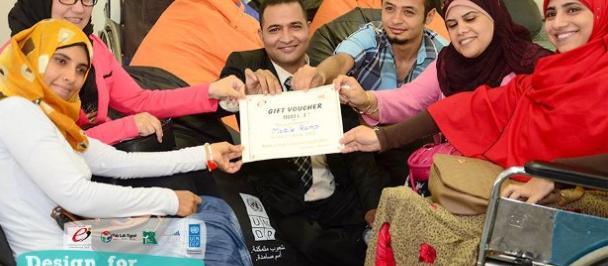Building Forward Better: toward a disability-inclusive, accessible and sustainable post-COVID-19 Arab States Region
Sarah Poole Remaks at the Virtual Dialogue:
December 2, 2020
Dear Colleagues, Dear Counterparts, Dear Partners
Good morning, good afternoon and thank you for being with us today.
It is with tremendous gratitude and optimism that I have the privilege of welcoming you and sharing an opening reflection for a discussion today that is timely and urgent.
At the outset I thank our partners at UN-ESCWA for co-hosting this event with us UNDP in the Arab States region, for the panelists for their analysis and perspective, and to all participating today, especially those who can share first-person perspective on disability.
In particular I thank and welcome Mehrinaz Elawady of ESCWA, who will deliver remarks on behalf of Executive Secretary Rola Dashti; our UNDP Regional Goodwill Ambassador Michael Haddad; Ola Abu Alghaib of the UN Partnership on Persons with Disabilities Fund; Hala Sakr of WHO; Sumaya Almajthoob, also of ESCWA; and from our UNDP Syria office, Resident Representative Ramla Khalidi, and programme partner Shahed Shabaan.
I also warmly thank Sara Minkara for moderating – Sara is a leading advocate of authentic inclusion and has played a large role in inspiring us at UNDP in the Arab States to advance in our approach to inclusion.
Today we will discuss the imperative of disability-inclusion in the response to COVID-19 and the road to the 2030 Agenda, and its principle of Leaving No One Behind.
The event is timely. Not only because this is the week of the year when we all promote an understanding of disability issues and mobilize support for the dignity, rights and well-being of persons with disabilities. Or that it is the time when we seek to increase awareness of the gains to be had from the full inclusion of persons with disabilities as partners in every aspect of political, social, economic, education, and cultural life.
Those facts are true, but the event is truly timely because we are in an urgent situation – a situation in which the many inequalities that have long faced persons with disabilities are being exposed and exacerbated in ways that are alarming, and unacceptable.
Even in normal times, one billion persons with disabilities worldwide are less likely to access education, healthcare and livelihoods or to be included in the community. Persons with disabilities also face discrimination, higher rates of gender-based violence, and exclusion from services and decision-making. Again, even under normal circumstances, this situation is further exacerbated for those living in humanitarian and fragile contexts – as is the case in many countries in the Arab States region.
Yet the times of today are not normal. Not for any of us. And for persons with disabilities, long-standing challenges are in many cases worsening even more.
Indeed, the COVID-19 pandemic is intensifying the inequalities facing persons with disabilities, and producing new threats. Persons with disabilities are disproportionately affected by health, social and economic impacts of COVID-19, as outlined by the Secretary-General in his policy brief A Disability-Inclusive Response to COVID-19 and as highlighted by so much of the analytical work and assessments that UNDP and partners have carried out in recent months.
Addressing the current challenges and barriers faced by persons with disabilities requires commitment and creativity. That’s why the theme of this year’s International Day is Building Back Better: Toward a Disability-Inclusive, Accessible, and Sustainable Post-COVID-19 World. And that’s why we are convening this event, to bring forward ideas, hear from practitioners and stakeholders, build our collective knowledge and mobilize for action now when it is most needed – be it the scaling up of programmes using technology to increase equitable access to public services, ensuring inclusion is mainstreamed in post-crisis efforts, or supporting counterparts to develop national inclusion strategies … there is a good amount of work underway to build on, but so much more to do to bring inclusion front and center across all areas of development.
As a closing thought, let me acknowledge the enthusiasm that many of us have to seize the response to COVID-19 as an opportunity to set the record straight, and to stretch the frontiers of policy and programme to be more inclusive and relevant to the needs of the day. The only silver lining we can find on this cloud of COVID-19 is this: that we learn a true lesson of the imperative of sustainable and inclusive development for all.
If indeed we are to come out of this crisis better than we were when we entered it, if truly we are to build forward better – full inclusion of persons with disabilities not as beneficiaries but as partners, and now, is an essential move in the right direction. It is the responsibility of each of us and all of us to ensure this is so, from learning, advocacy and awareness raising like today to full commitments to real change and action – not just during this week, but every day of the year.

 Locations
Locations
